- Home
- Technical Cooperation Projects
- Index of Countries
- Asia
- Viet Nam
- Project to Support the Planning and Implementation of NAMAs in a MRV Manner (SPI-NAMA)
- Project News
- Summary of JICA-GEF Joint Side Event during the GEF 54th Council and 6th Assembly
Project News
2018-06-26
Summary of JICA-GEF Joint Side Event during the GEF 54th Council and 6th Assembly
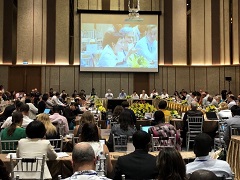 The GEF CEO Ms. Naoko Ishii discussing at the GEF 6th Assembly
The GEF CEO Ms. Naoko Ishii discussing at the GEF 6th Assembly
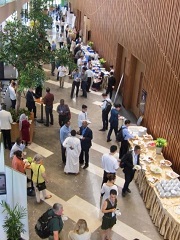 At the convention center in Da Nang
At the convention center in Da Nang
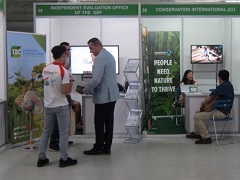 Booths of the international partners
Booths of the international partners
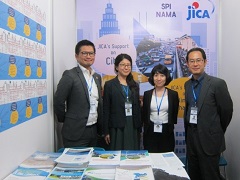 The booth of SPI-NAMA at the GEF Assembly
The booth of SPI-NAMA at the GEF Assembly
At the margin of the 54th Council and 6th Assembly of Global Environmental Facility (GEF) in Da Nang, Vietnam from 23rd to 26th June 2018, SPI-NAMA Project has organized JICA-GEF Joint Side Event entitled Multi-stakeholder Dialogue on Southeast Asian Cities on the Rise, covering the theme of climate change and the role of cities. The theme is both timely and relevant, not only the recognition of the role of non-state actors under the Paris Agreement per se, but also it is placed as the core part of GEF's Integrated Approach Programs, and is successfully carried over to the 7th Replenishment Cycle for elaboration.
This Joint Side Event has served as the second session of the Multi-stakeholder Dialogue series embarked in conjunction with the UNFCCC COP23 Bonn Conference last December 2017, with an aim to bring together key stakeholders of Southeast Asian cities to share concrete experiences and lessons to respond to climate change in the city context, and to collectively think through the ways forward, particularly in view of aligning city-level actions with Paris-compliant and enhance technical readiness for its implementation. By so doing, the Project disseminates its outcomes of institutional technical capacity buildings undertaken in Viet Nam to broader international audiences while also providing opportunities for HCMC counterparts to refine skills to communicate effectively at international setup.
The Dialogue started with sharing of concrete experiences of city efforts: namely, Bangkok Metropolitan Administration and Ho Chi Minh City (HCMC), as well as lessons and envisaged direction of the GEF's Integrated Approach Program for Cities under its 7th replenishment cycle:
| 1) | Introduction of the Side Event & Framing Presentation on Climate Support to Cities | Mr. Koji Fukuda CTA / JICA Long-term Expert |
| 2) | JICA's Institutional Capacity Building Support to Manage GHGs in the Selected Southeast Asian cities and Lessons Learned: (1) Bangkok Metropolitan Administration | Mr. Makoto Kato Team Leader / JICA Short-term Expert |
| 3) | (2) Ho Chi Minh City | Mr. Ha Minh Chau Deputy Head of DMHCC / In Charge Manager Climate Change Bureau |
| 4) | Lessons from the GEF's Sustainable Cities program | Mr. Aloke Barnwal the GEF Senior Environmental Specialist / IAP Coordinator |
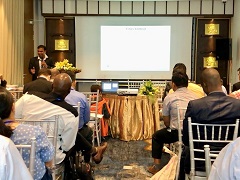 Sharing the lessons from the GEF's Sustainable Cities program
Sharing the lessons from the GEF's Sustainable Cities program
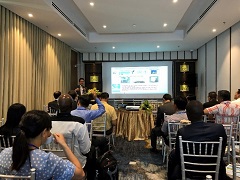 Sharing the lessons from Bangkok Metropolitan
Sharing the lessons from Bangkok Metropolitan
Following the presentations, an interactive dialogue among panelists and the audiences was undertaken, with moderation of Mr. Mohammed I. Bakkar, Senior Environmental Specialist of GEF/IAP.The dialogue mainly focused on the following discussion points, among others, to exchange views:
- To what extent the current global trend surrounding cities contribute to preparation for implementation of the Paris Agreement
- Possibilities to expand city-to-city cooperation beyond North-South (Yokohama-Bangkok) to South-South (e.g. Bangkok - HCMC)
- The level of engagement of the national government to support mutual learning and coordination among cities
- How to best implement multi-sectorality as the core part of climate change agenda
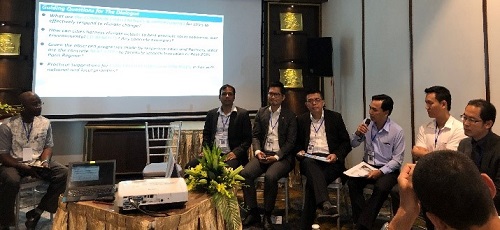 HCMC representative answering question from the participants
HCMC representative answering question from the participants
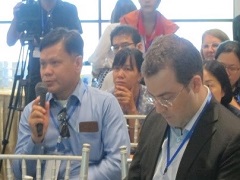 The topic actively discussed
The topic actively discussed
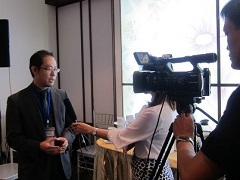 CTA interviewed by media
CTA interviewed by media
During the Dialogue, following main lessons and methodologies were discussed and shared among the panelists and participants:
- Progress and lessons from city's actions against climate change with North-South collaboration has been shared. It was pointed out if there are more spaces for South-South interaction in SEA.
- From the perspective of combating climate change at city level, Mr. Mohammed shared the idea that socio-economic development of city often sacrifices the environmental quality resulting in trade-offs e.g. increasing GHG emissions.
- As a taken away message, the dialogue concluded that institutional frameworks should be sorted out to effectively address multi-sectoral requirement of implementing climate actions.
Aside from the Dialogue, SPI-NAMA has set up the booth to showcase various climate-related support conducted by JICA across the globe while the Project Chief Technical Advisor explained the Project activities and JICA's projects in answering the interviews from media's journalists.
The detailed agenda is as follows:
| 12:30 – 12:40 | Introduction of the Side Event & Framing Presentation on Climate Support to Cities | Mr. Koji Fukuda Japan International Cooperation Agency (JICA) Chief Technical Advisor, JICA SPI-NAMA Project |
|---|---|---|
| 12:40 – 13:00 | JICA's Institutional Capacity Building Support to Manage GHGs in the Selected Southeast Asian cities and Lessons Learned (Bangkok Metropolitan Administration and HCMC) |
Mr. Makoto Kato Japan International Cooperation Agency (JICA) Team Leader for JICA SPI-NAMA HCMC & Bangkok Master Plan on Climate Change 2013-23 |
| Mr. Nguyen Huy Phuong HCMC Climate Change Bureau/Department of Natural Resources and Environment (DONRE) |
||
| 13:00 – 13:15 | Lessons from the GEF's Sustainable Cities program | Mr. Aloke Barnwal The Global Environmental Facility (GEF) Senior Environmental Specialist / IAP Coordinator |
| 13:15 – 13:55 | Multi-Stakeholder Dialogue and Q&As Facilitator: Mr. Mohamed Imam Bakarr Lead Environmental Specialist, Global Environmental Facility (GEF) Panelists
|
|
| 13:55 – 14:00 | Take-Away Messages | Mr. Mohamed Imam Bakarr Lead Environmental Specialist Global Environmental Facility (GEF) |
- About JICA
- News & Features
- Countries & Regions
- Our Work
- Thematic Issues
- Types of Assistance
- Partnerships with Other Development Partners
- Climate Change / Environmental and Social Considerations
- Evaluations
- Compliance and Anti-corruption
- Science and Technology Cooperation on Global Issues
- Research
- JICA Development Studies Program / JICA Chair
- Support for the Acceptance of Foreign HRs / Multicultural and Inclusive Community
- Publications
- Investor Relations
